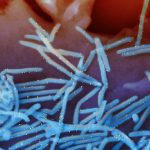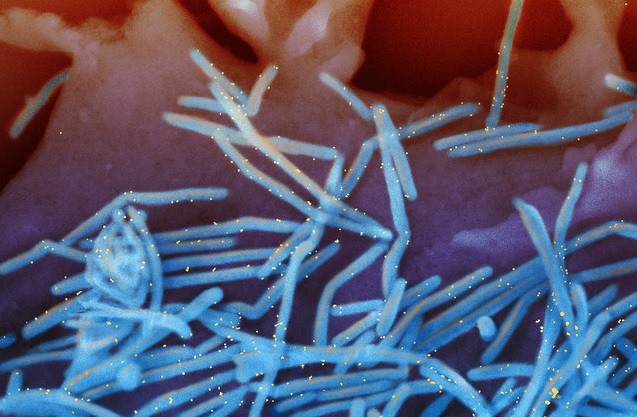
Scanning electron micrograph of human respiratory syncytial virus (RSV) virions (colorized blue) and labeled with anti-RSV F protein/gold antibodies (colorized yellow) shedding from the surface of human lung epithelial A549 cells. Credit: NIAID
A unique adjuvant, a substance that enhances the body’s immune response to toxins and foreign matter, can prevent vaccine-enhanced respiratory disease, a sickness that has posed a major hurdle in vaccine development for respiratory syncytial virus (RSV), according to a study led by the Institute for Biomedical Sciences at Georgia State University.
The study suggests that combining this adjuvant, which was created by the research team, with RSV vaccination might prime the body for protective immune responses and prevent inflammatory RSV disease after infection. The findings, published in the journal Virology, could lead to advances in RSV vaccine development.
RSV, a common respiratory virus that causes cold-like symptoms, is the leading cause of serious respiratory diseases such as bronchiolitis and pneumonia in children younger than 1 year of age in the United States. Each year in the U.S., an estimated 57,000 children younger than 5 years old are hospitalized with an RSV infection. RSV is also a significant cause of respiratory illness in older adults, resulting in 177,000 hospitalizations and 14,000 deaths each year, according to the Centers for Disease Control and Prevention (CDC). There is no vaccine to prevent RSV.
Progress on a vaccine for RSV almost ceased in the 1960s after a formalin-inactivated RSV vaccine being tested in the U.S. not only failed to protect children, but resulted in many infants experiencing worse symptoms than usual, requiring hospitalization after natural infection with the virus. Two toddlers died from enhanced disease symptoms. Other RSV vaccines have been known to cause enhanced disease after RSV infection.
This study investigated the effects of a unique adjuvant on vaccine-enhanced respiratory disease after infant and adult mice were vaccinated against RSV and exposed to the virus. The adjuvant was created by combining pathogen-recognizing receptor agonist adjuvants monophosphoryl lipid A (MPL) and oligodeoxynucleotide CpG (CpG), which are known to activate innate immune responses.
Infant and adult mice were injected with either RSV fusion proteins only, RSV fusion proteins plus adjuvant or a control phosphate buffered saline solution. Blood samples were taken after three weeks. Four weeks after vaccination, mice were intranasally infected with RSV and samples were taken to determine the efficacy of protection.
The adjuvant was found to be effective in promoting the induction of protective antibodies, clearing the lungs of the virus after exposure to RSV and avoiding disease in lung tissue.
“RSV subunit vaccination adjuvanted with a unique combination pathogen-recognizing receptor agonist might provide protection against RSV, preventing inflammatory RSV disease after infection. However, its efficacy in larger animal models and in humans remains unknown,” said Dr. Sang-Moo Kang, lead author and a professor in the Institute for Biomedical Sciences at Georgia State.
Source: Georgia State University

















